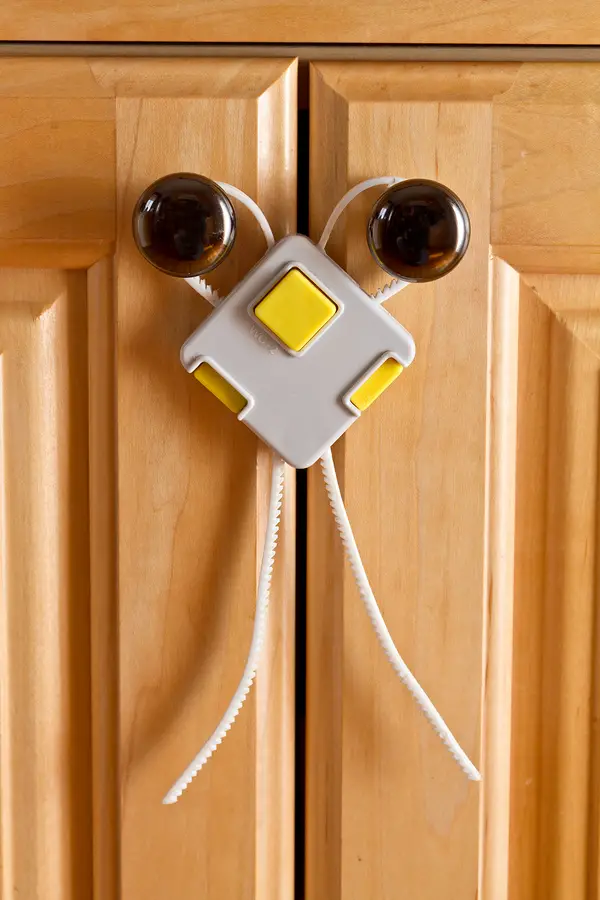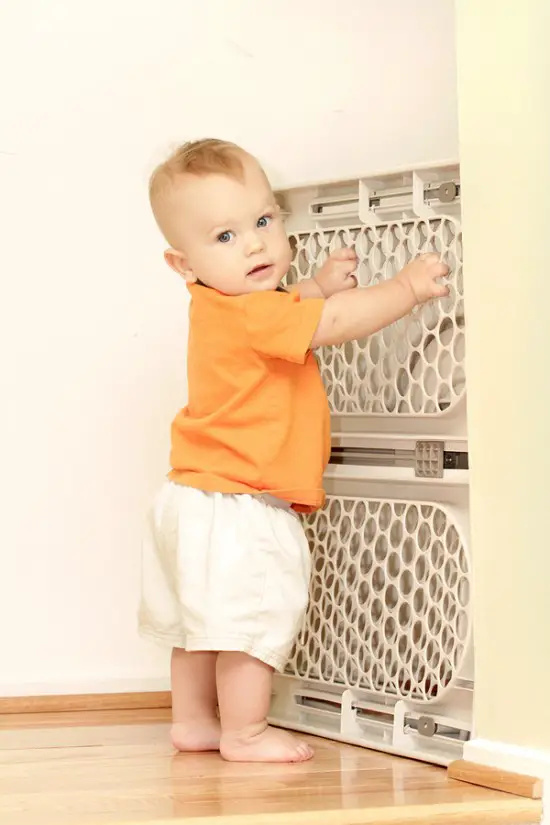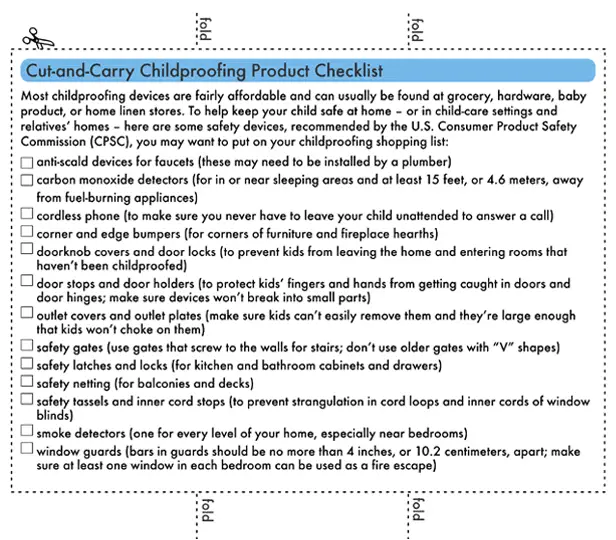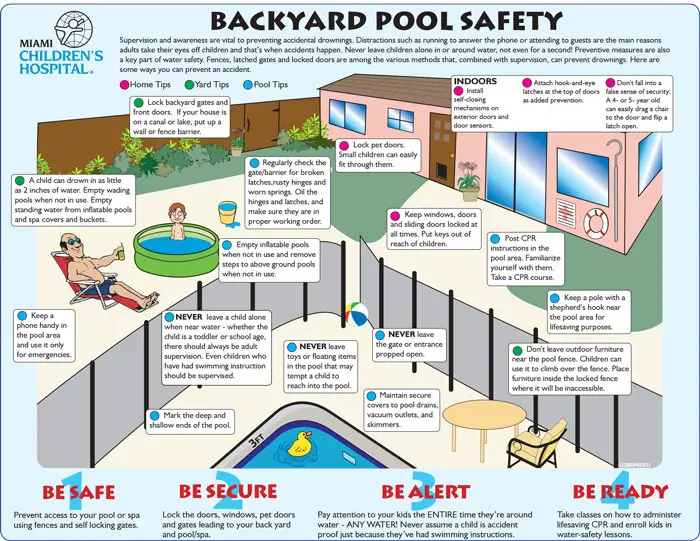A manufactured home is only a bit different from any other home when it comes to childproofing. We’ll cover those differences and provide a few resources for properly childproofing your manufactured home in this article.
Common Issues
There are a few common issues when buying childproofing products – Cabinetry is usually open, meaning that although there are several cabinet doors there is just one large space behind them so all the doors must be locked. Interior doors can be a tad bit narrower and regular child safety gates won’t fit well. Doorknob locks may not work properly cause the doorknob is a bit smaller. Usually, the worse that you’ll deal with when childproofing your manufactured home is a trip back to the store to exchange your purchase for a better fitting product.
Childproofing Your Manufactured Home
If you are expecting a new baby (woo-hoo!) or have guests coming for a visit it can’t hurt to take a quick look around and see if you can make your home a bit safer for the little ones and their parents. It can reduce stress for everyone and prevent accidents which is always a good thing.
Taking just a moment to walk through your home and make a list of anything that could hurt a child while he/she is playing or moving around the house can give you an idea of what you need.
Most Common Child-Proofing Needs
- Notate any cabinets that baby can get into, especially if household cleaners are stored. My daughter got into our cabinet that we stored dog food in once. Who knows if she ate any, or how much she ate, but it was all over the place by the time I finished unloading the washer. I learned a lesson to add cabinet locks on ALL the cabinets and not just the ‘dangerous’ ones!

Sharp corners on tables, entertainment centers, counters, and cabinetry can be dangerous to small children. Try and decide which corners are likely to cause injury and cover them with something soft or with rubber covers. Especially if they are just learning to walk.
Older mobile homes aren’t known for having ample outlets so homeowners have to add additional outlets via extension cords, power strips, or surge protector type devices. Those are especially dangerous to small children. So if you can add outlet covers to all the outlets that would help a lot. Look for outlets that are low on the wall and easily reachable and cover them with plastic covers so that no child can insert their fingers or other objects into the outlet. If there are outlets in use where the child plays regularly, clean up the way that the wires lay on the floor. Tuck them underneath carpet or tape them to the wall to prevent them from being pulled, tripped on, or tampered with.
Cabinets, refrigerators, and bathrooms often hold foods, chemicals or medications that can be fatal to children if ingested. Provide secure closures so that the compartments “lock” enough that children can’t get into them. Furthermore, keep all medications in child-proof bottles so that, should they be left out, a child cannot open them.
- Bookshelves and other tall furniture should be secured to the wall. Children love to climb and top-heavy furniture will topple easily. If you have a high dresser with a TV sitting on top you can use a small J bracket to secure it to the wall – just screw into a stud.
- Keep electronics unplugged in bathrooms and kitchens. Water is very dangerous when mixed with electricity. Make sure your home has GFIC outlets near all water sources, but even better, unplug everything and keep it out of reach.
Checklists to Help with Childproofing your Manufactured Home
Kidshealth.org has a great checklist you can print:
Don’t Forget the Outdoors!
Think about the outside of your house and where a child plays when he or she is out there. Pools are especially scary when it comes to small children. Miami Children’s Hospital released an informative pool safety flyer:
PoolSafely.gov has a small checklist for pool safety at home:
- Is there a fence around the perimeter of your pool or spa?
- Are there self-closing and self-latching gates?
- Are there door, gate or pool alarms in use?
- Does your pool have anti-entrapment drain covers that are compliant with the P&SS Act?
- Are all pool and spa covers in working order?
- Did you make sure the public pool or spa you use been inspected to ensure it is compliant with federal, state and local laws?
- Has someone in the family received training in CPR, first aid and emergency response?
- Has everyone learned to swim?
I don’t mean to be a fear-monger in this article. Children have survived for thousands of years without any childproofing gadgets. Still, a little preparation can make your home a bit safer if you aren’t used to having small children around or if you are a new parent. When it comes to childproofing: An ounce of prevention is better than a pound of cure!
As always, thank you for reading Mobile and Manufactured Home Living!





Thank you for sharing this unique information. A lot of people may not be aware of how to baby proof a mobile home. I also appreciate the fact that you mention outside safety tips as well. When it comes to childproofing our homes, it should always include the interior AND exterior. After all, accidents can happen anywhere. I would also like to recommend that all parents get certified in First Aid and CPR. This way just in case an emergency presents itself, you are best prepared to handle it. Thanks again for sharing!
It is not my first time to visit this web site, i am browsing this website dailly and get nice
facts from here all the time.
Hi Cassie!
We used a latching system on the doors. You screwed the latch into the cabinet frame and the handle into the door then you pressed down to open it. It worked well. Here’s what it looks like: http://www.homedepot.com/p/Prime-Line-Cabinet-Catch-Plastic-S-4438/202639125
I’ve seen straps that you attach with a sticky strip that looks like it would work on all cabinets and drawers too. Here they are: http://www.homedepot.com/p/Summer-Infant-Silver-Multi-Use-Safety-Latch-2-Pack-30230/205116313
Best of luck and thanks so much for reading MHL!
Hello,
My husband and I have two boys and are expecting our first girl in November. We moved into a mobile home a year ago. When trying to childproof the kitchen we have really struggled with the drawers and cabinets. We have tried just about all the products that Walmart carries. What product or products would you recommend. We have the cabinet handle lock on one of the cabinets but the other cabinets handles do not face the same direction. Currently we have a huge gate blocking the kitchen. We would love to be able to take that down. Help? Cassie